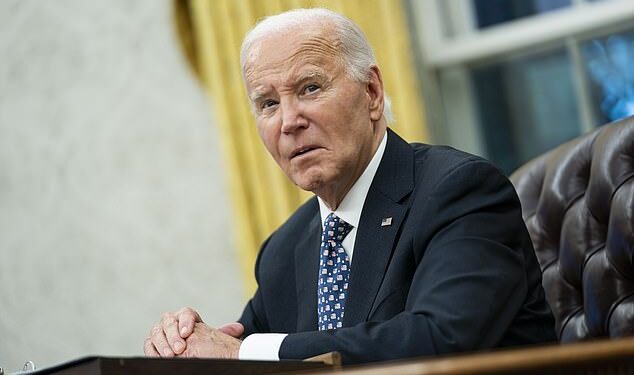A senior Israeli official has accused the U.S. of endangering IDF troops by leaking information about its planned ground invasion of Lebanon.
As reported by The Times of Israel, an unnamed official called the leaks ‘dangerous’, adding that ‘this was done even though the U.S. supports the operation but it is clear that the U.S. is worried – and therefore they outed the operation to try to limit it’.
The comments come amid reports that ministers in Israel‘s political security cabinet were left frustrated that the news of their planned invasion was leaked when an unnamed US security official confirmed yesterday to different news outlets of an impending ‘limited’ invasion into Lebanon.
In addition, during a U.S. State Department briefing Monday, spokesman Matthew Miller said that Israel had ‘told us that those are limited operations focused on Hezbollah infrastructure near the border’.
President Joe Biden also told reporters yesterday that he was ‘more aware than you might know’, before adding: ‘We should have a cease-fire now’.

Israeli ministers are reportedly frustrated over leaked reports of an invasion into Lebanon from the U.S. and the IDF

A picture taken from northern Israel, along the border with southern Lebanon, on September 30, 2024 shows a fire following Israeli bombardment on an area of south Lebanon

A man looks at the destruction at the site of an overnight Israeli airstrike on the Ruwais neighbourhood in Beirut’s southern suburbs today
It comes as the IDF confirmed last night a ‘targeted and delimited ground operation in southern Lebanon’ against ‘terrorist targets and infrastructures of the terrorist organization Hezbollah’.
Spokesman Daniel Hagari added that the villages Israel is targeting are ‘near the border, which pose an immediate and real threat to Israeli settlements’.
The long-awaited ground invasion of Lebanon came after a day of ratcheting in tensions in the war-torn region.
The incursion, dubbed ‘Operation Northern Arrows’ by the IDF will continue ‘according to the situational assessment and in parallel to combat in Gaza and in other areas’.
The ground assault, which comes nearly a year on from Hamas’ October 7 attacks, was given the green light after hundreds of Israeli tanks had massed on the border, with foot soldiers also being supported by the IDF’s intensified air strikes.
Dramatic pictures showed a barrage of rockets and bombs lighting up the sky, while artillery fire was heard in a number of villages close to the Israel-Lebanon border.
The deployment of boots on the ground represents a significant escalation in Israel’s war against Hezbollah, whose leadership has been wiped out in a series of recent airstrikes.
Meanwhile, Hezbollah hit back this morning by sending a barrage of rockets into northern Israel.
It comes as the Pentagon confirmed last night that thousands of American troops had been deployed to the region amid fears that fighting between Israel and Hezbollah in Lebanon could escalate into an all-out regional war.
The Biden administration is hoping to avoid the situation spiraling into a broader war that could potentially drag in U.S. forces, and has urged Israel to keep its incursion limited in scope.

Smoke rises following an Israeli airstrike in the town of Khiyam, southeastern Lebanon

Israeli soldiers work on tanks at a staging area in northern Israel near the Israel-Lebanon border, Oct. 1, 2024

Smoke seeps out from building rubble at the site of an overnight Israeli airstrike on the Laylaki neighbourhood in Beirut’s southern suburbs on October 1, 2024

Residents inspect the damage following an overnight Israeli airstrike on the Ain al-Helweh camp for Palestinian refugees on the outskirts of the southern port city of Sidon early on October 1, 2024

Israeli army tanks manoeuvre in a staging area in northern Israel near the Israel-Lebanon border

Israel was last night bombarding Lebanon from the sky and on foot as an incursion got underway
The U.S. has also warned that Iran will face ‘serious consequences’ if it attacks Israel.
Defense Secretary Lloyd Austin, in a call with his Israeli counterpart Yoav Gallant on Monday night, said the US ‘supports Israel’s right to defend itself.’
‘We agreed on the necessity of dismantling attack infrastructure along the border to ensure that Lebanese Hizballah cannot conduct October 7-style attacks on Israel’s northern communities,’ he wrote on X.
He added that ‘I reiterated the serious consequences for Iran in the event Iran chooses to launch a direct military attack against Israel,’ Austin said.
On Sunday, Austin warned that ‘should Iran, its partners or its proxies use this moment to target American personnel or interests in the region, the United States will take every necessary measure to defend our people.’
Ahead of the incursion last night, Israeli Prime Minister Benjamin Netanyahu issued his own warning to Iran, which backs Hezbollah and Hamas.
‘There is nowhere in the Middle East Israel cannot reach,’ Netanyahu said, just days after an airstrike south of Beirut killed Hassan Nasrallah, the long-time leader of the Hezbollah.
The group’s acting leader, Naim Kassem, said his fighters were ‘ready for war’ and prepared to fight on for a long time if necessary.







